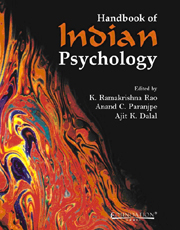Book contents
- Frontmatter
- Contents
- Contributing Authors
- Preface
- 01 Prologue: Introducing Indian Psychology
- 02 Indian Thought and Tradition: A Psychohistorical Perspective
- PART I SYSTEMS AND SCHOOLS
- PART II TOPICS AND THEMES
- PART III APPLICATIONS AND IMPLICATIONS
- Pronunciation and Transliteration of Sanskrit Alphabet
- Glossary
- Index
01 - Prologue: Introducing Indian Psychology
Published online by Cambridge University Press: 26 October 2011
- Frontmatter
- Contents
- Contributing Authors
- Preface
- 01 Prologue: Introducing Indian Psychology
- 02 Indian Thought and Tradition: A Psychohistorical Perspective
- PART I SYSTEMS AND SCHOOLS
- PART II TOPICS AND THEMES
- PART III APPLICATIONS AND IMPLICATIONS
- Pronunciation and Transliteration of Sanskrit Alphabet
- Glossary
- Index
Summary
The Handbook of Indian Psychology is a collection of thirty one articles specially written for this volume by scholars scattered around the globe on a subject little known among the students of psychology. Psychology in the Indian tradition has a wider and more inclusive perspective than in the West. It draws from a variety of sources and permits multiple interpretations. It contains meta-theoretic postulates as well as simple practical recipes for good behaviour. In between there is a wealth of psychological wisdom, at once provocative and challenging to the students of human nature. Indian psychology is holistic and inclusive, glossing over dichotomies such as subject and object, natural and supernatural, secular and sacred. One can find in it innovative ideas, interesting in some ways and controversial in some other respects, as well as perplexing methodological manoeuvers to overcome paradoxes by a method of magical synthesis that provides for the coexistence of contraries like science and spirituality. Consequently, Indian psychology may be seen as profound or plain irrelevant to current psychological concerns, depending on how one looks at it. This volume is a modest attempt intended to focus on the profound, calling attention to some of the significant psychological insights contained in the classical Indian wisdom.
The authors contributing to this volume are from multiple disciplines that include academic psychology, classical Indian philosophy, religious studies, management science, psychotherapeutic practice and pedagogic disciplines. They all have interest in Indian psychology as an up-and-coming discipline that has important implications for their own subjects and occupations. A majority of them are Hindus, but several authors belong to other religious and cultural traditions.
- Type
- Chapter
- Information
- Handbook of Indian Psychology , pp. 1 - 18Publisher: Foundation BooksPrint publication year: 2008
- 10
- Cited by

